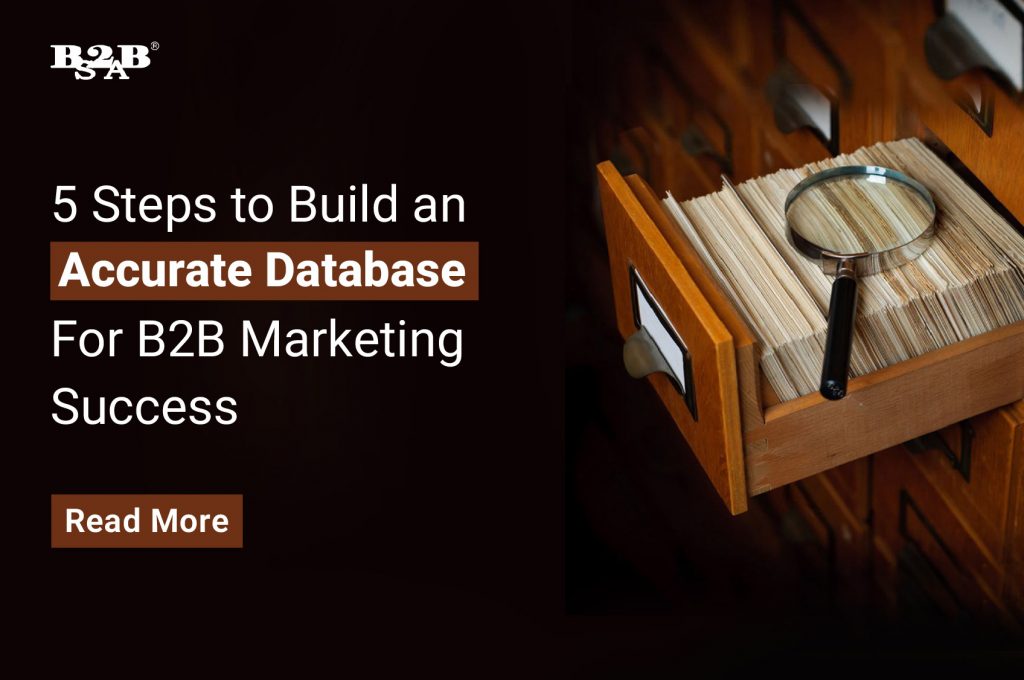
Your most lucrative marketing propositions packed with game-changing products or services will, plausibly, fail even to receive an acknowledgment if they do not reach the most pertinent audiences, including Key Decision-makers from your target organizations. Ironically, around 42% of sales leaders deem a lack of access to reliable B2B contact data a pivotal impediment to effectuating an acute outreach campaign.
B2B databases primarily consist of data points such as contact details, functions, and designations of C-level executives from target accounts. Marketing teams leverage the data bank to calibrate various sales and marketing activities, including developing an Ideal Customer Profile (ICP), demand generation, lead generation, outbound sales, market research services, analytics, etc.
A chart-topping B2B marketing campaign largely depends on a high-performing outreach campaign designed to establish a direct connection with the CXOs from the companies most likely to reap the benefits of your brand offerings. Subsequently, the efficacy of the outreach campaign is directly proportional to the quality of the B2B database marketing teams gain access to. Consequently, B2B marketing imperatives necessitate organizations to make strategic investments in curating custom databases of accurate B2B contacts that perfectly match their Ideal Customer Profile.
This blog highlights key strategies organizations must execute to develop accurate databases containing reliable, actionable, and compliant data essential for B2B marketing success:
- Define Marketing Objectives: Invest some time to clearly define the main objectives of the B2B databases before starting to develop one, whether the organization is keen on expanding its presence in an existing market or putting out feelers before entering a new one. Your marketing objectives will dictate the database structure, size, and development protocols.
- Develop Your Ideal Customer Profile (ICP): Marketing teams should develop a detailed persona of the prospect organizations (industry, size, revenue, geography) that could benefit from your offerings along with the key decision-makers or key influencers (job title, business function, seniority, etc.) your sales teams would be keen to connect and engage in conversations with.
- Compliance: If you choose to in-house or outsource your database augmentation, ensure that the third-party agency aligns with the region-specific data compliance regulations such as GDPR (General Data Protection Regulation) across Europe, CCPA (California Consumer Privacy Act) in California, PIPEDA (The Personal Information Protection and Electronic Documents Act) in Canada, etc.
- Choose The Right Data Source: Count on the right sources to acquire high-quality data for your B2B sales and marketing campaigns, based on your organization’s objectives, business requirements, and marketing priorities.
- Partner With A Reliable B2B Data Provider: This is arguably the most common and the most efficient option for building a B2B database if you want to gain quick access to a bulk of prospects. You can partner with a reliable Global Contact Discovery Solution provider to procure a comprehensive, up-to-date, and highly accurate B2B database, including direct-dial phone numbers and verified email addresses of the prospects from your target market. The third-party vendors empower you with a large quantity of contact information and various attributes related to firmographics, technographics, intent data, account data, and market research services, which will help you refine your search.
- Develop a B2B Database In-house: A cost-effective approach, manual data scavenging relates more to startups, small B2B organizations, and those with minimal financials.
There is a high likelihood of your prospects having a social media account on multiple platforms, including leading professional networking sites. Additionally, the websites of your target organizations are a great source of B2B data. Websites such as these typically feature the latest news releases, the story of their brand journey, and the ‘Meet The Team’ section.
Take abundant precautions to avoid poor data quality as you would be relying heavily on the internet and manual data collection programs. You must perform data cleansing and validation exercises in addition to data collection. The process will likely consume a significant amount of time and other resources.
- Develop High-Quality Gated Content: Invest in creating highly relevant and thought-provoking content that helps you connect with your target audiences. You can trade your users’ contact information with high-quality gated content such as e-books, blogs, whitepapers, podcasts, and webinars.
Though a cost-efficient option for building your contact database, the option requires an upfront time investment. Opt-in lists are curated much slower and may contain user-generated errors. The efforts tend to snowball over time and yield healthy returns on your assets in the form of qualified leads for your sales team.
- Data Validation and Quality Check: Performing stringent quality checks on your database will enable you to achieve accurately updated and well-structured data. While an excel data scan can identify duplicate entries, email list cleaning services leverage cutting-edge tools to track down fake email addresses, and spam traps and remove incomplete or inaccurate domain names. Additionally, subscriptions to renowned online databases support data validation exercises to ensure sales and marketing teams receive correct and accurate information as B2B databases decay each year.
Summing Up
Organizations choose the most appropriate strategic option for developing their sales and marketing databases based on their objective, size, and constantly evolving marketing preferences. The increasing competition in the B2B marketing landscape requires you to leverage high-quality contact data to deliver your key marketing messages to targeted prospects, ensuring a steady stream of highly-qualified leads to strengthen your sales success further. If implemented effectively, the strategy discussed above can arm sales and marketing teams with accurate B2B database information that is correct, verified, and compliant.

